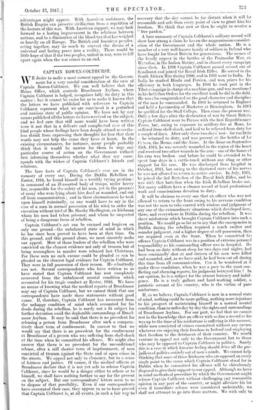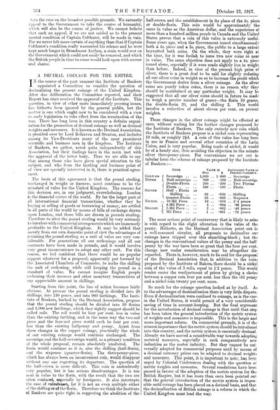CAPTAIN BOWEN-COLTHURST:
WE desire to make a most earnest appeal to the Govern- ment fora very careful consideration of the case of Captain Bowen-Colthurst. We can well believe that the Homo Office, which controls Broadmoor Asylum, where Captain Colthurst is lodged, recognizes fully its duty in this matter ; but it cannot be amiss for us to make it known that the letters we have published with reference to Captain Colthurst represent what we arc convinced is a perturbed and anxious state of public opinion. We have not by any means published all the letters we have received on the subject, and we feel sure that still more would have been written were it not that in a delicate and complicated case of this kind people whose feelings have been deeply stirred neverthe- less shrink from expressing their thoughts for fear that their words may not help the cause they have at heart. In the existing circumstances, for instance, many people probably think that it would be unwise for them to urge any particular course of action on the Government without first informing themselves whether what they say corre- sponds with the wishes of Captain Colthurst's friends and relations.
The bare facts of Captain Colthurst's case are in the memory of every one. During the Dublin Rebellion at Easter, 1916, he found himself in a terribly trying position : in command of an ill-assorted body of troops, under heavy fire, responsible for the safety of his men, yet in the presence of many who were lying about him dead or \Sounded, and cut off from communication ; and in these circumstances lie took upon himself (criminally, as one would have to say in the rose of a man in normal possession of his wits) to order the execution without trial of Mr. Sheehy Skeffington, an Irishman whom his men had taken prisoner, and whom he suspected of being a dangerous focus of rebellion.
Captain Colthurst's act can be excused and forgiven on only one ground—the unbalanced state of mind in which he has since been proved to have been at that time. On this ground, and this ground alone, we most sincerely make our appeal. Most of those leaders of the rebellion who were convicted on the clearest evidence not only of treason but of being accomplices in murder were released last Christmas. For these men no such excuse could be pleaded as can be pleaded 011 the clearest legal evidence for Captain Colthurst. They were in full possession of their reason. He admittedly was not. Several correspondents who have written to us have stated that Captain Colthurst has now eompletdy recovered from the unbalanced mental condition which accounted for his tragic conduct at Easter, 1916. We have no means of knowing what the medical reports of Broadmoor may say of Captain Colthurst, but we cannot think that our correspondents have Made these statements without. good cause. lf, therefore, Captain Colthurst has recovered from the unhappy condition of mind which accounted for his deeds during the rebellion, he is surely not a fit subject for further detention amid the deplorable surroundings of Broad- moor Asylum. It may be said that there is no precedent for releasing a person from Broadmoor after such a compara- tively short term of confinement. In answer to that we would say that there is no precedent for the confinement at Broadmoor of a person who was suffering from shell-shock at the time when he committed his offence. We might also answer that there is no Precedent for the unconditional release, after a still shoiter terns of imprisonment, of men convicted of treason a"ainst the State and of open crime in the streets. We appeal not only to clemency, but to a sense of fairimes and justice. Of course, if the medical officers at Broadinoor declare that it is not yet safe to release Captain Colthurst, since he would be a danger either to others or to himself, we shall have nothing further to say for the present on the subject. But our correspondents' letters seem to us to dispose of that .possibility. Even if our correspondents have overstated their caSe, they appear to us to have proved that Captain Colthurst is. at all eventa. in such a fair way to
recovery that the day cannot be far distant when it will be reasonable and safe front every point of view to grant hint his freedom. We think that now or then he ought to receive a " free pardon."
A bare summary of Captain Colthurst's military record will show how strong a claim he has on the magnanimous consider- ation of the Government and the whole nation. He is a member of a very well-known family of soldiers in Ireland who have fought for Great Britain for generations. The names of the family appear in the battles of the Peninsular War, at Waterloo, in the Indian Mutiny, and in almost every campaign since then. In 1898 Captain Colthurst passed second out of Sandhurst and joined the Royal Irish Rifles. Ile served in the South African War during 1900, and in 1901 went to India. India he studied Hindu and Persian, and won prizes for his efficiency in both languages. In 1901 he took part in the Tibet campaign in charge of a machine-gun, and was mentioned in his battalion Orders for the excellent work he did in the field. He was also congratulated on the good character and discipline of the men he commanded. In 1908 he returned to England and held a Lectureship of Musketry at Birmingham. In 1913 he qualified for the Staff College. Then e,aine the present war. Only a few days after the declaration of war by Great Britain Captain Colthinst went to France with the first Expeditionary Force, but., owing to exposure to artillery-fire at Mons, he suffered from shell-shock, and had to be relieved from duty for a couple of days. After only these two days' rest— far too little — he returned to duty, and was present at the battles of he Catcall, the Marne, end the Aisne. At the Aisne on September 15th, 1914, he was severely wounded in the region of the heart and received two other wounds in the arm--one of the bones cf his anti was broken- and before he could be attended to he spent four days in a cattle-truck without any sling or other support for his ann. He was discharged from hospital in October, 1911, but owing to the shattered state of his nerves he was not allowed to return to active service. In July, 1915, he joined the 3rd Battalion of the Royal Irish Rifles, and lie was with that battalion when the Irish Rebellion broke out.. Not many soldiers have a cleaner record of hard professional work and conscientious devotion to duty.
It will be obvious to every one that an officer who was not allowed to return to the front owing to his nervous condition was not the titan to take control with wisdom and judgment of any one of the extraordinary situations which developed here, there, and everywhere in Dublin during the rebellion. It was sheer misfortune which brought Captain Colthurst into' uch is position. We would go so far as to say that the emergencies in Dublin during the rebellion required a much swifter and sounder judgment, and a higher degree of self-possession, than are required even at the front. When he committed his offence Captain Colthurst was in a position of extreme personal responsibility as his commanding officer was in hospital. lle had been on duty without sleep for two days end nights, had been continually shot at and sixteen of his men were killed and wounded, and, as we have said, be had been cut off during this time from all communication. Can it be wondered at if under these conditions, when he was a prey to the most con- flicting and alarming reports, his judgment betrayed him ? In our opinion, he is a subject for the utmost leniency and indul- gence. He is a truly gallant and hard-working soldier, a patriotic servant of his country, who is the victim of pure misfortune.
If, as we believe, Captain Colthurst is now in a normal state of mind, nothing could be more galling, nothing more injurious to his prospect of maintaining himself in a normal mental condition, than to suffer day by day the sights and- surroundings of Broadmoor Asylum. For our part, we feel that we cannot rest in the knowledge that an officer with so fine a record as his
was up to the time of his misfortune is suffering in this manner, while men convicted of crimes committed without any excuse
whatever are enjoying their freedom in Ireland and employing that freedom to the detriment of their country. We would venture to appeal not only to the Government but to those who may be opposed to Captain. Colthurst in polities. Surely this is a case in which humane feeling should drive all the pre- judices of politics entirely oat of men's minds. We cannot help thinking that some of those Irishmen who are opposed on every single point to the cause which Captain Colthurst stood for in Dublin when he committed his offence will he chivalrously disposed to give their support to our appeal. Although we have
in mind methods of procedure by which the Government might release Captain Colthurst without challenging any reasonable opinion in any part of the country, or might alleviate his lot even if immediate release were considered undesirable, we shall not attempt to go into these matters. We wish only to.
(-PAU the case on the broadest possible grounds. We earnestly appeal to the Government to take the course of humanity, which will also be the course of justice. We cannot believe that such an appeal, if we are not misled as to the present mental condition of Captain Colthurst, will be made in vain. For we never felt more certain of anything than that if Captain Colthurst's condition really warranted his release and he were kept much longer in Broadmoor Asylum, a stain would rest on the Government which could not easily be removed, and which the British people in time to come would look upon with sorrow and shame.



































 Previous page
Previous page